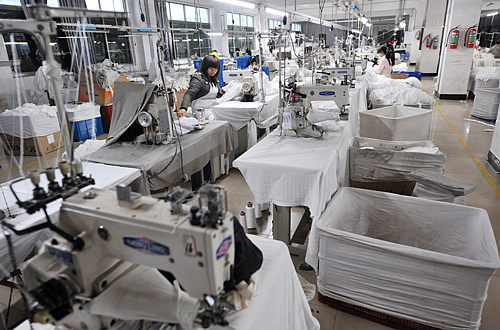|
 |
|
BUSY PRODUCTION: Employees in a sock plant in Yiwu, Zhejiang Province, work diligently on sewing machines to fill orders (WANG DINGCHANG) |
In Wenzhou of Zhejiang Province, the boomtown of China's private economy, three renowned manufacturers—Jiangnan Leather, Portman Coffee and electronics maker Sanqi Group—have recently declared bankruptcy, sparking concerns that a wave of factory closures may be sweeping through the region. Newspapers have been filled with reports that 20 percent of Wenzhou's nearly 300,000 small and medium-sized enterprises (SMEs) have halted production.
"The situation is even worse than in 2008 when the financial crisis rippled through China, causing massive plant closures and painful job losses," said Zhou Dewen, Deputy Director of the China Association of Small and Medium Enterprises.
As policymakers twist harder on the country's credit screws, smaller businesses are finding themselves financially strained and with the ominous shadow of costs inflation hanging over their growth prospects, said Zhou.
The China Banking Regulatory Commission (CBRC) and Zhejiang Provincial Small and Medium Enterprise Bureau said massive factory closures are not going to happen and the three corporate failures are isolated cases, in part due to mismanagement and reckless expansion. "But it is true that many SMEs are already swimming in the red ink," they said.
Data from the Zhejiang Provincial Small and Medium Enterprise Bureau showed, in the first quarter, Zhejiang's SMEs above a designated size reported an industrial output value of 934.91 billion yuan ($143.8 billion), up 25.5 percent from a year ago, 8.5 percentage points lower than the same period last year. In January and February alone, 6,757 Zhejiang's SMEs incurred combined losses of 4.87 billion yuan ($749.2 million), surging 22 percent from the previous year.
The current fear is the downturn may be spreading nationwide. The Ministry of Industry and Information Technology (MIIT) said 15.8 percent of SMEs above a designated size spilled red ink in the first two months of this year, 0.3 percentage points higher than a year earlier.
MIIT chief engineer and spokesman Zhu Hongren said global economic uncertainties have had a deep impact on SMEs, especially export-oriented ones.
"It's an unintended and unfortunate consequence when credit is tightened through quotas," said Wang Tao, a UBS economist in Hong Kong. "Small companies suffer first, and suffer the most."
The cause
Serious costs inflation fuelled by rising land and labor costs is eating into the profits of smaller companies, said Guo Tianyong, Director of the Research Center of China's Banking Industry at the Central University of Finance and Economics.
In 2010, 30 provinces, municipalities and autonomous regions raised their minimum wage standards by at least 10 percent in a move to bridge the growing rich-poor gap.
Surging international commodities prices also translate into higher producer prices in China through trade links, he said.
Meanwhile, the yuan's appreciation is draining life from vulnerable exporters, and power shortages that began in May forced many to shut down entire production lines, said Guo.
On top of this came tightened monetary policies as the country continues its fight against inflation. The People's Bank of China, the central bank, raised interest rates twice and hiked the reserve requirement ratios six times this year.
It is not without justification commercial banks consider vulnerable smaller businesses larger risks, fearing they will get stuck with bad debts. To fend off credit risks, commercial banks have imposed much higher lending rates on SMEs and increased their collateral requirements.
"As the domestic monetary environment tightens, we have grown very selective of our clients," a banker at the Zhejiang branch of the Industrial and Commercial Bank of China, who refused to be identified, told 21st Century Business Herald. "Banks tend to shut the door to SMEs since they lack a sound credit record and a sound future."
| 